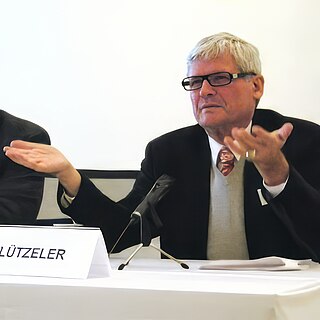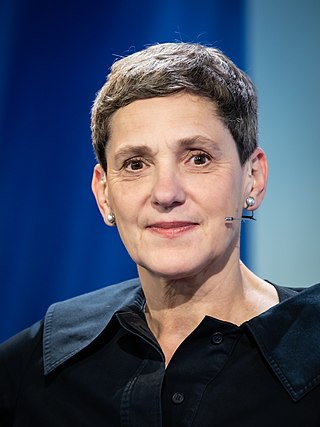Related Research Articles

Peter Rühmkorf was a German writer who significantly influenced German post-war literature.

Paul Michael Lutzeler is a German-American scholar of German studies and comparative literature. He is the Rosa May Distinguished University Professor Emeritus in the Humanities at Washington University in St. Louis.

Felicitas Hoppe is a German writer. She received the Georg Büchner Prize in 2012.

Karl Krolow was a German poet and translator. In 1956 he was awarded the Georg Büchner Prize. He was born in Hanover, Germany, and died in Darmstadt, Germany.

Hanns-Josef Ortheil is a German author, scholar of German literature, and pianist. He has written many autobiographical and historical novels, some of which have been translated into 11 languages, according to WorldCat: French, Dutch, Modern Greek, Spanish, Chinese, Lithuanian, Japanese, Slovenian, and Russian.

Jörg Baberowski is a German historian and Professor of Eastern European History at the Humboldt University of Berlin. He studies the history of the Soviet Union and Stalinist violence. Baberowski earlier served as Director of the Historical Institute and Dean of the Faculty of Philosophy I at the Humboldt University in Berlin.
Ernst Benkard was a German art historian and private lecturer.
Sybille Steinbacher is a German historian. Since May 2017 she has been Professor of Holocaust Studies at Goethe University Frankfurt.
Rudolf Gerber was a German musicologist. He was professor and director of the musicology department of the University of Gießen and from 1943 professor of musicology at the University of Göttingen.
Rudolf Bülck was a German librarian.
Wulf Raeck is a German archaeologist, specializing in classical archaeology.
Otto Vossler was a German historian.
Werner Gembruch was a German historian.
Notker Hammerstein is a German historian. His research interests are mainly in the field of University history and history of science as well as the history of the Holy Roman Empire of the German Nation.
Gerrit Walther is a German historian.
Johannes Kunisch was a German historian. He held chairs of early modern history at the Goethe University Frankfurt. (1972-1976) and the University of Cologne (1976–2002). Through his publications Kunisch became one of the leading German early modern historians. His biography Frederick the Great, published in 2004 and widely acclaimed, gave lasting impulses to Prussian research.

The album amicorum was an early form of the poetry book, the autograph book and the modern friendship book. It emerged during the Reformation period, during which it was popular to collect autographs from noted reformers. In the 1700s, the trend of the friendship book was still mainly limited to the Protestant people, as opposed to the Catholics. These books were particularly popular with university students into the early decades of the 19th century. Noteworthy are the pre-printed pages of a friendship book from 1770 onwards, published as a loose-leaf collection by the bookbinder and pressman Johannes Carl Wiederhold (1743-1826) from Göttingen.
Rudolf Vierhaus was a German historian who mainly researched the Early modern period. He had been a professor at the newly founded Ruhr University Bochum since 1964. From 1971, he was director of the Max-Planck-Institut für Geschichte in Göttingen. He became known for his research on the Age of Enlightenment.

Ewald Grothe is a German historian. Since 2009 he has been an extraordinary professor at the Bergische Universität Wuppertal and since 2011 he has been head of the Archive of Liberalism of the Friedrich Naumann Foundation for Freedom in Gummersbach.

Otto Heuer was a German literary historian. He served as the director of the Freies Deutsches Hochstift literary association from 1888 until his retirement in 1925.
References
- ↑ "PD Dr. Michael Maaser". Goethe University Frankfurt (in German). Retrieved 16 June 2020.
- ↑ "Historische Kommission für Hessen 120. Jahresbericht" (PDF) (in German). Retrieved 16 June 2020.
- ↑ "Deutsche Akademie für Kulinaristik e.V. – Vorstand" (in German). Retrieved 16 June 2020.
- ↑ . "Frankfurter Historische Kommission: Mitglieder" (in German). Retrieved 16 June 2020.
- ↑ "Denkmalbeirat feiert Jubiläum" (in German). 13 July 2017. Retrieved 16 June 2020.
- ↑ "Führung durch das Dorf Steinheim" (in German). St. Nikolaus Steinheim. Retrieved 16 June 2020.
- ↑ "Galerie – Führung durch das Dorf Steinheim" (in German). Retrieved 16 June 2020.
- ↑ "Geschichte der Schule" (in German). THS Hanau. Retrieved 16 June 2020.